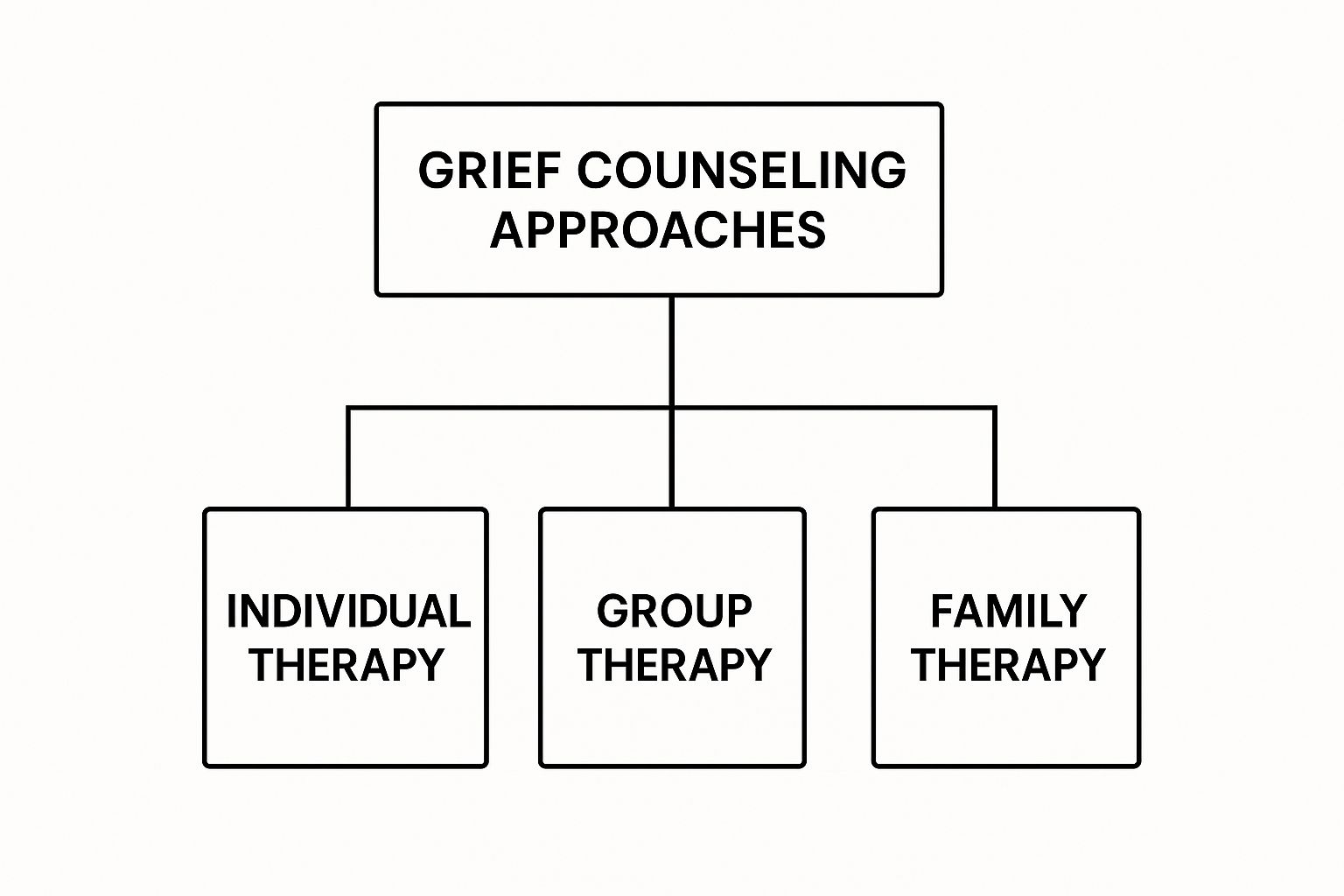When you lose someone or something you love, the world can feel like it's been turned upside down. Grief counseling is a specialized form of therapy designed to help you find your footing again. It’s not about erasing the pain, but about learning how to walk alongside it.
This process provides a safe, supportive space where you can explore the incredibly complex and often overwhelming emotions that come with loss—without any judgment.
What Grief Counseling Actually Looks Like

Think of grief as a dense, unfamiliar forest. You know you need to get through it, but the path is unclear and it's easy to get lost. A grief counselor acts as an experienced guide. They can't walk the path for you, but they can hand you a map and a compass, pointing out landmarks and helping you navigate the roughest terrain.
The central goal is to help you process your unique response to loss. For some, the journey through grief becomes incredibly difficult, leading to what is known as Prolonged Grief Disorder (PGD). This condition affects an estimated 7-10% of bereaved adults, making structured, professional support not just helpful, but truly necessary for many.
Building a New Path Forward
A good counselor helps you find constructive ways to honor the person you've lost while rediscovering a sense of purpose and direction in your own life. This isn't about letting go, but about finding a new way to hold on.
Creating meaningful rituals or new traditions can be a beautiful way to keep their memory alive. It’s about celebrating the love that remains, which is why services from companies like Aerial Ash Scattering can be such a profound part of the healing journey for families.
Grief counseling is about integration, not elimination. The goal is to weave the memory of your loved one into the fabric of your life, allowing you to carry them forward with love, not just with pain.
Learning how to cope with loss is the foundational step. Counseling offers a personalized roadmap for that journey, equipping you with strategies tailored specifically to your experience and the unique relationship you shared.
Recognizing When You Might Need Support

It’s never easy to know when to ask for help with grief. There’s no official timetable for healing, and while sadness is a perfectly normal part of the process, some signs suggest that professional support could make a world of difference. The real question isn't how long you've been grieving, but how much that grief is impacting your ability to live your life.
One of the most common signs is feeling completely and utterly "stuck." This might show up as a constant, heavy sense of emptiness or the feeling that you simply can't picture a future without your loved one. When those feelings don't ease up for months and start affecting your job, your health, or your relationships, that's a strong signal that counseling could provide a way through the fog.
Key Signs to Watch For
The circumstances of the loss often play a big role. A sudden or traumatic death—like an accident or a fast-moving illness—can leave you reeling with complicated emotions that are incredibly tough to sort through on your own. Likewise, the loss of a child is a uniquely profound experience that frequently requires specialized support to navigate.
Take a moment to consider if any of these feel familiar:
- Overwhelming Emotions: Are you constantly wrestling with intense anger, guilt, or self-blame that just won't let up?
- Pulling Away from Life: Have you found yourself isolating from friends and family, or losing interest in hobbies you used to love?
- Daily Life Feels Impossible: Does getting through a normal day of work, chores, or even basic self-care feel like an insurmountable challenge?
- A Lost Sense of Self: Do you feel like a part of your identity is gone, and you no longer know who you are?
If any of this rings true, reaching out is a sign of profound strength. The practical side of life doesn’t stop, and juggling work on top of everything else adds another layer of stress. It can be helpful to know what your options are by looking into resources that explain bereavement leave policies, which can give you the space you need to breathe.
Seeking support is not a sign of weakness; it is a courageous step toward healing. It acknowledges that some burdens are too heavy to carry alone and shows a commitment to your own well-being.
Ultimately, the decision to try grief counseling is yours alone. But simply recognizing these signs in yourself or someone you care about is the first, most important step toward finding relief and building resilience.
Understanding Different Therapeutic Approaches
Walking into a grief counseling session for the first time can feel a little intimidating, mostly because the process itself seems like a mystery. But it’s not. Grief counseling is built on well-established, evidence-based methods that provide a real framework for healing. Think of a skilled therapist like a master craftsman; they have a whole toolkit of approaches ready, and they know exactly which tool to use for your specific experience of loss.
Common Therapeutic Methods
One of the most frequently used and effective methods is Cognitive-Behavioral Therapy (CBT). Imagine your grief is a heavy backpack, weighed down by painful, looping thoughts like, "I should have done more," or "I'll never be happy again." CBT helps you gently unpack that bag. You'll learn to look at each of those heavy thoughts, challenge the ones that aren't serving you, and reframe them in a way that’s healthier and more compassionate. It doesn't magically erase the sadness, but it can significantly lighten the crushing weight of guilt and despair.
Another powerful approach is Person-Centered Therapy. Here, the therapist's main job is to create a space that feels incredibly safe, warm, and completely free of judgment. You are in the driver's seat. Your therapist acts as a supportive guide, reflecting your feelings and helping you uncover your own strength and answers. This entire method is founded on one core belief: you are the ultimate expert on your own grief.
To help clarify some of the most common techniques, here’s a quick breakdown of what you might encounter in a counseling session.
A Guide to Common Grief Counseling Techniques
This table outlines several therapeutic models a counselor might use, explaining their primary goal and who might benefit most from each one.
| Therapeutic Approach | Primary Goal in Grief Counseling | Best For Individuals Who... |
|---|---|---|
| Cognitive-Behavioral Therapy (CBT) | To identify, challenge, and reframe negative thought patterns and behaviors that complicate grief. | Are struggling with guilt, blame, or catastrophic thinking related to their loss. |
| Person-Centered Therapy | To provide a supportive, non-judgmental space for clients to explore their feelings and find their own path to healing. | Prefer a less-structured approach and want to lead the direction of their own therapy sessions. |
| Acceptance and Commitment Therapy (ACT) | To help individuals accept the reality of their loss and the pain it brings, while committing to living a meaningful life. | Feel "stuck" in their grief and want to find a way to move forward without "getting over" their loss. |
| Narrative Therapy | To help individuals re-author the story of their loss, separating their identity from the trauma and finding new meaning. | Feel defined or consumed by their grief and want to reclaim their personal story. |
Each of these methods offers a different lens through which to view and process loss. The right one for you often depends on your personality, your specific struggles, and what feels most comfortable.
Individual, Group, and Family Settings
Just as important as the how is the where and with whom. The setting for your counseling can dramatically shape the experience.

As you can see, support can be one-on-one with a therapist, shared with peers in a group, or navigated together with family members. Each format offers its own unique advantages.
Group therapy, for example, creates an incredibly powerful sense of community. There's something profound about sharing your story with others who just get it—no explanation needed. It can melt away the deep-seated feeling of isolation that so often comes with loss. Hearing their stories and finding supportive words of inspiration after a death is an incredibly validating and healing experience. It’s a living reminder that you are not on this journey alone.
Each therapeutic approach is a different path up the same mountain. The goal is not to find the "best" path, but the one that feels safest and most supportive for you to climb.
Ultimately, knowing what grief counseling is means understanding that you have options. Whether it’s individual sessions to dive deep, group support to feel connected, or family therapy to heal together, the goal is always the same: to find a personalized and effective route toward healing.
When Grief Gets Stuck: Understanding Complicated and Prolonged Grief

Grief is a part of life, but it doesn't always unfold in a straight line. For most people, the sharp, initial pain of a loss eventually softens, allowing them to move forward. But what happens when it doesn't?
Sometimes, that acute pain can get stuck, turning into a persistent, disabling condition that makes it almost impossible to function. This is what we call Complicated Grief, known clinically as Prolonged Grief Disorder (PGD).
Think of it this way: typical grief is like a deep wound that, with time and care, heals and becomes a scar. It’s still there, a part of you, but it no longer hurts to the touch. Complicated grief is a wound that refuses to close, remaining raw and open long after the initial injury.
Recognizing When Grief Has Become Prolonged
It can be tough to tell the difference between the deep, gut-wrenching pain of normal grieving and something more persistent. The key isn't the intensity of the sadness but its duration and how it impacts your life. Complicated grief means being trapped in that acute state of loss for an extended time, often six months or longer.
A few signs that the natural grieving process may have stalled include:
- An intense, persistent longing for the person who died that completely dominates your thoughts.
- Feeling emotionally numb or a deep-seated sense of disbelief, as if you can't process that they're truly gone.
- An ongoing struggle to accept the reality of the death, making it feel like life has lost all meaning.
- A total inability to re-engage with the world—pulling away from friends, abandoning hobbies, and losing interest in the future.
These aren’t just signs of deep mourning; they're red flags that something is preventing you from healing.
Complicated grief, which closely mirrors Prolonged Grief Disorder, impacts an estimated 7-10% of bereaved people. It's defined by that unrelenting, intense yearning for the deceased that gets in the way of everyday life. The Association for Behavioral and Cognitive Therapies provides excellent resources on this topic.
When these symptoms take hold, seeking out specialized grief counseling is crucial. For those navigating the particularly difficult journey of losing a partner, our guide on coping with the death of a spouse offers more specific support. A therapist trained in grief can provide the right tools to help you process the trauma and find a way to start healing.
How Culture and Community Shape Healing
We never grieve in a vacuum. The way we mourn, how we remember, and the path we take toward healing are all profoundly influenced by our cultural backgrounds, family traditions, and the communities we lean on.
Think about it: there's no universal script for grief. What brings comfort and solace in one culture might feel completely foreign or even inappropriate in another. A truly effective grief counselor understands and respects this incredible diversity. They move beyond a one-size-fits-all approach to honor the unique rituals, beliefs, and values that give your grieving process its own sacred meaning.
This kind of therapist recognizes that healing isn’t just an individual task—it's deeply woven into a much larger social and historical fabric.
The Power of Shared Traditions
The role of community in healing is immense. Whether it’s your church group, a tight-knit neighborhood, or family rituals passed down through generations, these support systems give us a vital sense of belonging. They create a safe space where our loss is seen, acknowledged, and shared.
Grief is not solely a personal experience; it is deeply influenced by social norms, religious practices, and the collective memory of loss. The upcoming 2025 International Death, Grief, and Bereavement Conference will explore these shared grieving practices. You can discover more about the effects of cultural and generational grief on the conference website.
Honoring Your Unique Path
This deep respect for tradition is exactly why personalized memorial services are so powerful. They offer families a way to say goodbye that feels authentic to who they are and honors their loved one's unique story. For example, services like Aerial Ash Scattering empower families to design a ceremony that truly reflects their cultural and personal values, creating a moment of genuine connection and release.
Ultimately, weaving these personal and cultural threads together is a crucial part of the healing journey. For anyone looking to create a ceremony that feels right, learning how to plan a memorial service is a foundational first step in crafting a meaningful and lasting tribute.
Answering Your Questions About Grief Counseling
Deciding to seek help is a big step, and it's natural to have questions about what comes next. Knowing what to expect can ease some of the anxiety, so let's walk through some of the most common things people wonder about when starting grief counseling.
What Happens During the First Session?
Think of your first meeting with a grief counselor as a gentle introduction, not an intense deep-dive. The main goal is simply to see if you feel comfortable and connected with the therapist.
You'll probably talk a little about what brought you in, your relationship with the person you lost, and maybe some initial thoughts on what you'd like to get out of your sessions. A good counselor will follow your lead. There's zero pressure to share anything you're not ready to. It’s all about creating a space where you feel safe and understood.
How Long Does Grief Counseling Last?
There’s no set schedule for healing, so there's no fixed timeline for grief counseling. Everyone's path is different. For some, a few months of focused work provides the tools and perspective needed to navigate their new reality.
For others, especially if the loss was traumatic or complicated, longer-term support might feel more appropriate. This is something you and your counselor will figure out together, creating a plan that works for you and adjusting it as you go.
The point of grief counseling isn't to "get over" the person you lost. It's about learning how to carry them with you in a new, healthy way—so their memory brings love and warmth, not just overwhelming pain.
Will It Help Me "Get Over" My Loss?
This is probably the most important question people have, and the answer is a gentle "no." Grief counseling isn't about erasing your loss or helping you "get over" it. Instead, it’s about helping you find a way to live with it. The person you lost will always be part of your story, and therapy respects and honors that.
The work is about learning to manage the sharpest edges of your grief so you can begin to rebuild a life that feels meaningful again. It's a shift from being defined by the pain of their absence to finding strength in their memory.
Is Online Grief Counseling Effective?
Absolutely. For many people, online counseling is just as powerful and effective as in-person sessions. The convenience is a huge plus—you can have your sessions from the comfort of your own home, without the stress of travel.
What truly makes therapy work is the connection you have with your counselor. A strong, trusting therapeutic relationship can be built just as easily through a screen as it can be in an office.
At Aerial Ash Scattering, we know that a meaningful farewell is a crucial part of the healing journey. We offer beautiful and dignified aerial ash scattering services to help you create a final tribute that truly honors the life of your loved one.


